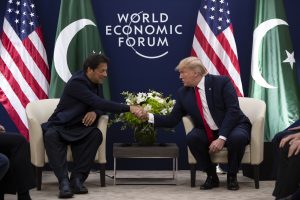By Syed Ali Zia Jaffery

Earlier this month, the much-awaited, all-important intra-Afghan dialogue began in Doha, Qatar. This is the first time that the Taliban and representatives from the Afghan government are directly engaged in negotiating the future of their country. In the United States-Taliban agreement, signed in February 2020, the intra-Afghan dialogue was dubbed critical to completing the Afghan reconciliation process and bringing lasting peace and prosperity in the war-torn country. The overall peace process in Afghanistan rested on two pillars: the U.S-Taliban agreement and the intra-Afghan dialogue. With all three parties — Washington, Taliban, and Kabul — engaging with each other, the prospect of a peaceful settlement of the Afghan imbroglio has increased.
Developments in the Afghan peace process have always had a direct bearing on the trajectory of Washington’s ties with Islamabad. Relations between the two countries have improved, owing to Pakistan’s positive role in helping the United States and the Afghan Taliban strike a deal. The commencement of the intra-Afghan dialogue, coupled with United States’ acknowledgement of Pakistan’s go-between efforts, is good news for Pakistan-United States relations.
There are two concomitant factors that explain why the all-Afghan parleys in Doha are propitious for Washington-Islamabad ties.
The first factor is the robust, continuous engagement between Pakistan and the United States, ever since the signing of the Doha deal. Direct contacts between interlocutors from both sides, months ahead of the intra-Afghan dialogue, focused on discussing ways to navigate speed bumps in the peace process arising out of an impasse over prisoners’ release and continued violence. Rather than blame Pakistan for the Taliban’s recalcitrance on both issues, the United States increased deliberations with Islamabad. Moreover, after failing to cajole Afghan politicians to establish a unified government — a step deemed essential in advancing the peace process — the United States pulled the plug on the Afghan government by threatening to slash $2 billion in Afghan aid. That Washington did not label Pakistan as the party erecting roadblocks in the peace process is a healthy sign for this on-again-off-again relationship.
Additionally, during the interregnum, the United States appreciated the endeavors of Prime Minister Imran Khan and Chief of Army Staff General Qamar Javed Bajwa toward peace in Afghanistan. All this shows that the trust deficit that had continually marred Pakistan-United States relations and consequently, peace in Afghanistan, has attenuated significantly. The level of cooperation and liaison between the two sides can be gauged by the fact that, a day ahead of the intra-Afghan talks, the commander of U.S. Central Command and Pakistan’s chief of army staff delved into the Afghan peace process. This was followed by a meeting between U.S. Special Representative for Afghan Reconciliation Zalmay Khalilzad and Pakistani officials, during which, while reiterating his laudatory remarks about Pakistan, Khalilzad said: “The United States will never forget the solidarity of our many allies and partners who have stood with us in the long struggle to end this war.”
Given that increasing levels of synergy between the two countries have helped surmount one of the biggest impediments to peace in Afghanistan, both Pakistan and the United States could commit themselves to carrying on with this approach, much to the benefit of their relations and Afghan peace.
The second factor is how Pakistan has increased its credibility as a stabilizer in the Afghan peace process — a likely source of the upswing in this topsy-turvy relationship. Pakistan’s appearance as a balanced actor, one that is not espousing favorites in Afghanistan, is one of the elements that could create more harmonious ties with the United States. Pakistan made concerted efforts to dispel the impression that it takes sides in Afghanistan. After the Doha deal, Pakistan carefully steered clear of wading into the infighting in Afghanistan. Despite Afghan President Ashraf Ghani’s diatribes against it, Pakistan did not root for his opponent, Abdullah Abdullah, during the political bickering in Kabul and quickly recognized the former as the new president of Afghanistan with a view toward working closely with him. Subsequently, Pakistan has maintained high-level contacts with the government in Kabul, as evidenced by a telephone conversation between Ghani and Khan, as well as Bajwa’s visit to Afghanistan.
Pakistan also took great strides in giving a softer touch to a troubled relation by opening its border to facilitate Afghan traders — even during the height of the pandemic — and establishing small markets along the border with Afghanistan. Islamabad has also pushed both leading factions in the Afghan negotiations — the Taliban and the Afghan government — toward direct negotiations. That this two-track engagement has delivered the goods is instructive for the United States. For Washington, Islamabad has not scuttled the peace process, increasing the chances of a smooth withdrawal of U.S. troops. At a time when the U.S. presidential election is less than two months away and President Donald Trump has announced a drawdown of forces in Afghanistan, Washington would not be enamored with the idea of upsetting the mode of engagement with Islamabad.
Continued collaboration with each other will not only help remove snags in the Afghan peace process, but will also pave the way for more vibrant relations between Pakistan and the United States. With both countries being relatively free from tactical-level irritants, conversations on other aspects of the relationship could take place. Such a milieu has become increasingly possible owing to the beginning of the intra-Afghan dialogue. Had the Afghans not come together to the negotiating table, the United States’ ties with Pakistan might have strained once again.
As things stand today, the intra-Afghan dialogue has given Islamabad and Washington some breathing space to recalibrate their ties. Absent a major breakdown in talks, the cooperative mechanism between the two countries is more than likely to remain intact, leading to the exploration of more windows of cooperation.
No comments:
Post a Comment